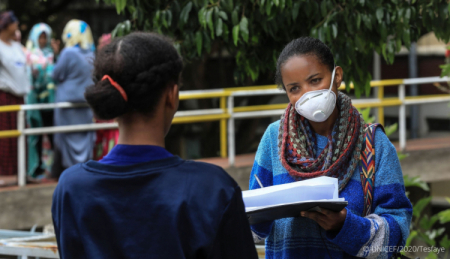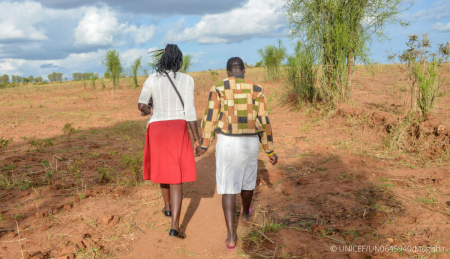
by Hugh Salmon, Director, Global Social Service Workforce Alliance
 Now that the Global Social Service Workforce Alliance has reached its 10th birthday, and we reflect on the progress made to strengthen the social service workforce at all levels, do we know what challenges lie ahead? And, are we ready to meet them?
Now that the Global Social Service Workforce Alliance has reached its 10th birthday, and we reflect on the progress made to strengthen the social service workforce at all levels, do we know what challenges lie ahead? And, are we ready to meet them?
In our first ten years as an alliance, we brought together a diverse, global membership, determined to bring global attention to the needs, and vital role of, a vast and unrecognised social service workforce. To do so, we worked with our members, partners, and supporters to develop a wide range of technical resources to help plan, develop and support the workforce across the globe. Our efforts, in partnership with various governments and UNICEF, to map and assess the social service workforce, revealed that the workforce is built around the core profession of social work, but to be effective and reach all those in need, it needs to unite a whole ecosystem of community volunteers, para professionals, supervisors, researchers, educators and policy makers, spanning public sector, private sector and civil society organisations, and those working in health, education and justice sectors, as well as in social welfare.
Once we had captured people’s attention at the 2010 Social Welfare Workforce Strengthening conference, and launched as an alliance in 2013, we have learned how the workforce has had to adapt and respond to a series of complex needs and emergencies: from the impact of HIV and AIDS to the impact of poverty, social, and racial injustice, to the impact of violence and lack of safe family-based care faced by millions of children worldwide. In early 2020, when COVID-19 started to spread rapidly, the workforce and its leaders were initially unprepared to cope with the impact of the pandemic on children, families and vulnerable individuals, but within a few months, and in some countries only a matter of days, the workforce rose to the challenge. They shifted to online ways of working and communicating, supervising and learning, while successfully lobbying to be recognised as an essential workforce that needs the protective equipment and the authority to continue visiting homes and communities, to deliver life-saving support, care and protection, and to dispel myths and restore hope.
 Social service workers, leaders and planners are now waking up to an even greater set of challenges resulting from accelerating climate change. We used to think that these issues were for environmental scientists, governments and UN bodies to address. We were aware that we all had to rethink our ways of living and working, reduce our carbon footprint and stop destroying our natural world, but we did not realise that as social service workers we would be addressing the consequences of climate change in our daily work, from families losing their livelihoods and being forced to migrate, to wildfires, floods and droughts destroying homes and communities. We now realise that we have the power and responsibility to act: to help people understand the risks and the need to prepare and adapt, but also to help with recovery. In 2022, this realisation brought our alliance together with a unique global gathering of people and organisations, not only social service workers but health workers, students, trade unions, indigenous rights activists and faith-based organisations, inspired by the human connectedness of Ubuntu, in a global online summit where we signed the first People’s Charter calling for the co-building of an Eco-Social World.
Social service workers, leaders and planners are now waking up to an even greater set of challenges resulting from accelerating climate change. We used to think that these issues were for environmental scientists, governments and UN bodies to address. We were aware that we all had to rethink our ways of living and working, reduce our carbon footprint and stop destroying our natural world, but we did not realise that as social service workers we would be addressing the consequences of climate change in our daily work, from families losing their livelihoods and being forced to migrate, to wildfires, floods and droughts destroying homes and communities. We now realise that we have the power and responsibility to act: to help people understand the risks and the need to prepare and adapt, but also to help with recovery. In 2022, this realisation brought our alliance together with a unique global gathering of people and organisations, not only social service workers but health workers, students, trade unions, indigenous rights activists and faith-based organisations, inspired by the human connectedness of Ubuntu, in a global online summit where we signed the first People’s Charter calling for the co-building of an Eco-Social World.These climate challenges, and resulting social upheaval, are compounded by the widening range of human conflicts, which result not only in mass casualties and trauma, and people losing their homes and families, but also in a breakdown of trust across ethnic and religious divides. We are seeing rising hostility and mutual blame, spreading online far beyond the site of the conflicts, sowing the seeds of future wars. To address these challenges, we cannot wait for outside help. Social service workers are embedded in every community, so we must unite our voices and efforts, not only to provide disability inclusive social care, child protection and mental health services, but also as local bridge builders, change agents and peacemakers. We need to be ready to support and protect when losses occur, but also committed to build empathy, mutual understanding and trust across communal divides, restore faith in humanity, and turn despair into hope, and a collective vision for a better world and a future of promise.
